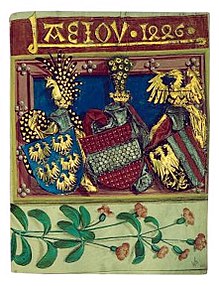
"A.E.I.O.U." (sometimes A.E.I.O.V.) was a symbolic device coined by Emperor Frederick III (1415–1493) and historically used as a motto by the Habsburgs. One note in his notebook (discovered in 1666), though not in the same hand, explains it in German and Latin as "All the world is subject to Austria" (Alles Erdreich ist Österreich untertan or Austriae est imperare orbi universo).[1] Frederick habitually signed buildings such as Santa Maria dell'Anima in Rome,[2] Burg Wiener Neustadt, or Graz Cathedral as well as his tableware and other objects with the vowel graphemes.[3] A.E.I.O.U. is also the motto of the Theresian Military Academy, established in 1751.[4] It can also be found on the wall of the Chancellor's office in the Federal Chancellery of Austria. The famous device is probably the most known motto of premodern times, because it has repeatedly been given new interpretations. Unraveling the mystery of what the AEIOU means is part of a centuries-long debate that is still ongoing today.[5]
Contemporary research has shown that the Roman chancellery of Frederick III used the interpretation En amor electis iniustis ordinor ultor. Sic Fridericus ego mea iura rego as the official motto. This interpretation has also been shown to be the most commonly used variant in the 15th century. It was also supposed that the Austriae est imperare variants probably go back to Frederick's proto-notary Heinrich Leubing.[6]
Interpretation
[edit]


Frederick's first use of the five-letter monogram was in 1437, when he was Duke of Styria. One note in his notebook (discovered in 1666), though not in the same hand, explains it in German and Latin as "All the world is subject to Austria" (Alles Erdreich ist Österreich untertan or Austriae est imperare orbi universo).[1]
Another passage, later in the same notebook, uses the letters in sequence as the initial letters of the words in the first line of a couplet poem, amor electis, iniustis ordinor ultor ("I am loved by the elect, for the unjust I am ordained an avenger").[1][7][8] This verse was probably adopted by Frederick from a poem by Nicolaus Petschacher of Znaim who worked as a court official in the 1440s.[9]
Other interpretations have been put forth, including by contemporary heraldists. Several explanations proceed on the assumption that it was meant as a political slogan.
- Austria est imperio optime unita ("Austria is best united by the Empire").[10]
- Austria erit in orbe ultima ("Austria will be supreme in the world", sometimes incorrectly given as "Austria will be the last (surviving) in the world").[10]
- Aquila electa iusta omnia vincit[7]
- Alle ere ist ob uns[7]
Since Frederick wrote this acronym when he was not yet the ruler of the Archduchy of Austria and, at that time, Styria was entirely separated from Austria and was not considered to be its part until the next century, the term "Austria" in this context would not mean Austria as a territory or a nation, but rather the "House of Austria", that is, the Habsburg dynasty.
Many Latin and German interpretations have been attempted over the centuries; most of these versions refer to a motto of present-day Austria or the extensive Habsburg monarchy.
In literature
[edit]In Joyce's novel Ulysses's 9th chapter, the phrase "A. E. I. O. U." means, "Æ, I owe you".
See also
[edit]- Fiat iustitia, et pereat mundus – the motto of Ferdinand I.
- FERT – Another motto of a European dynasty (the House of Savoy) whose meaning and origin is unclear.
- Plus ultra – the personal motto of Charles V and I, and through him the modern motto of Spain.
- Austrian Empire
- Universal monarchy
- Sator square
- Pax Austriaca
- Lo Boièr
References
[edit]- ^ a b c "AEIOU". Die Welt der Habsburger. Retrieved 2 August 2018.
- ^ Romedio Schmitz-Esser: Friedrich III. und die Präsenthaltung des abwesenden Herrschers. In: Zeitschrift für Historische Forschung 46, 2019, 592.
- ^ Brewer, E. Cobham (1978) [reprint of 1894 version], The Dictionary of Phrase and Fable, Edwinstowe, England: Avenel Books, p. 1, ISBN 0-517-25921-4
- ^ GmbH, Typoheads. "Emblem of the Theresan Military Academy". www.milak.at. Retrieved 2023-10-22.
- ^ Romedio Schmitz-Esser: Friedrich III. und die Präsenthaltung des abwesenden Herrschers. In: Zeitschrift für Historische Forschung 46, 2019, 575.
- ^ Konstantin M. Langmaier, Zur Devise Kaiser Friedrichs III. (1415–1493). In: Zeitschrift des Historischen Vereins für Steiermark 113 (2022), 7-32.
- ^ a b c Armorial of Ulrich Rösch (Cod. Sang. 1084) p. 40 (1488)
- ^ Konstantin Langmaier: Kaiser Friedrich III. (1415–1493): des Reiches Erzschlafmütze?, Der „schlafende Kaiser“ als Klischee. In: Zeitschrift des Historischen Vereins für Steiermark. 111, 2020, 175-176.
- ^ Alphons Lhotsky, Quellenkunde zur mittelalterlichen Geschichte Österreichs, in: MIÖG, Erg. Bd. 19, 1963, 344f.
- ^ a b "A", Meyers Konversationslexikon, (various authors), Volume 1, page 1, 1885–1890, web (Commons): MKL-b1-p1: has "A.E.I.O.U." on first page of entire 16-volume encyclopedia, as 3 Latin phrases: Austriae est imperare orbi universo and Austriae est imperium orbis universi with the German phrase Alles Erdreich ist Oesterreich unterthan noted with Friedrich III., plus a 3rd Latin phrase Austria erit in orbe ultima with Österreich wird bestehen bis ans Ende der Welt (sometimes given in English as "Austria will stand until the end of the world" but in the Latin closer to "Austria will be supreme in the world"; cf. Cic. Fin. 3, 9, 30, “summum bonum, quod ultimum appello”); note that Oesterreich is Österreich ("Oe") with first letter "O". "Ö" is not considered a separate letter in German.
Further reading
[edit]- Andrew Wheatcroft's The Habsburgs: Embodying Empire (1995), ISBN 0-14-023634-1.
External links
[edit] Media related to A.E.I.O.U. (Habsburg) at Wikimedia Commons
Media related to A.E.I.O.U. (Habsburg) at Wikimedia Commons